With iftar dinners, South Florida Muslim community hopes to build bridges during Ramadan
They happen every night in homes, mosques and many other places in South Florida during the Muslim holy month of Ramadan. The faithful and their guests break a daylong fast during an evening meal called iftar — a celebration typically starting with the sugary, sticky bite of a date, said to be one of the Prophet Muhammad’s favorite foods.
These festive dinners tend to feature similar food and prayer but, as visits to iftars across Miami-Dade and Broward counties show, each also can be different, some reflecting the region’s multicultural influences. Empanadas, for instance, likely aren’t on a lot of traditional iftar tables.
Some South Florida iftars focus on lessons about Islamic tradition. Others aim at building bridges between faith groups. Some mosques in Broward joined in a grand iftar dinner to raise awareness and funds for Palestinian people caught in the Israel-Hamas war. Overall, many organizers say, the nightly gatherings have become increasingly popular and diverse — important in a era of deep social and political division.
“The iftar is taking over in South Florida. Cities are doing it, masjids are doing it. Politicians, elected officials are all coming to masjids,” said Imam Sheikh Shafayat Mohamed, founder of the Darul Uloom mosque in Pembroke Pines. “But what we need to do after Ramadan is to continue this relationship with other churches and synagogues.”
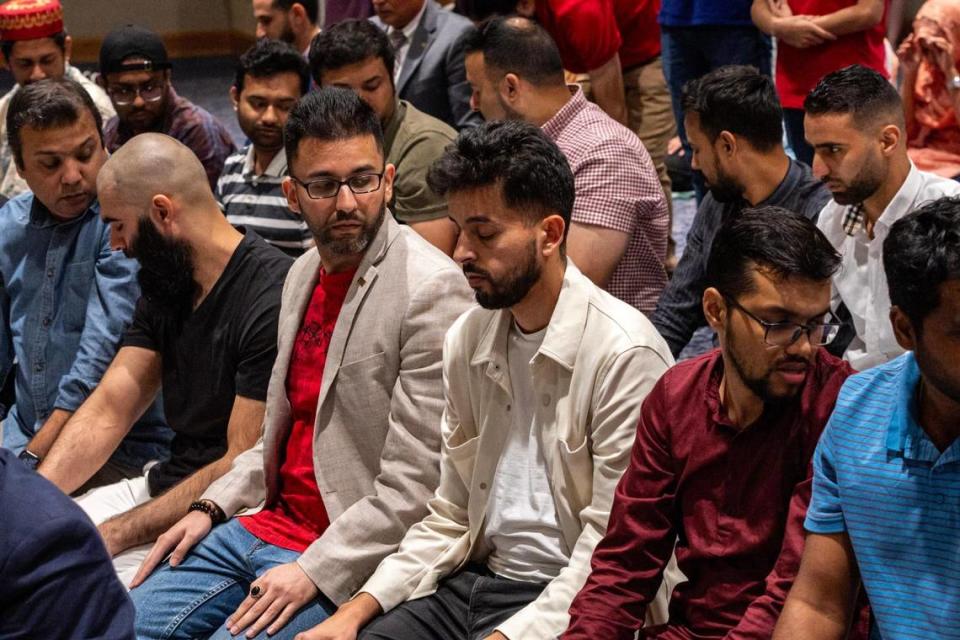
‘Record’ number of city-sponsored events
Though it is an ancient tradition for Muslims, iftar meals — starting in March and ending with a grand celebration, Eid al-Fitr, in mid April — aren’t solely for believers.
That was clear at multiple iftars in both counties, where plenty of non-Muslims were in attendance. Those included a “record number” of city-sponsored iftar dinners, mostly happening in Broward, where the Muslim population is estimated to be the highest among South Florida counties, according to the Samir Kakli, president of the South Florida Muslim Federation, which represents dozens of the regions’ mosques and Islamic schools.
At one city-sponsored iftar in Pembroke Pines — the first of its kind there — some city officials, faith leaders and members of various South Florida mosques made small talk while munching on dates and empanadas. Before breaking the fast, Imam Sheikh Shafayat Mohamed spoke about the importance of such interfaith events.
“I think it’s important especially now, for all of these cities and elected officials to get to know Islam, to get to know Muslims,” said Shafayat. “We don’t have to wait for some problem before we get together to socialize.”
At another iftar in Hallandale Beach, Dr. Barbara Sharief, former Broward county commissioner and the county’s first Black female and Muslim mayor, used her comments to touch on the charged topic of on-going war in the Middle East.
“When we talk about the month of Ramadan and what that means … whether you’re Muslim or not, Christian or Jew it doesn’t matter, peace is what is needed so that people in each region can thrive.”
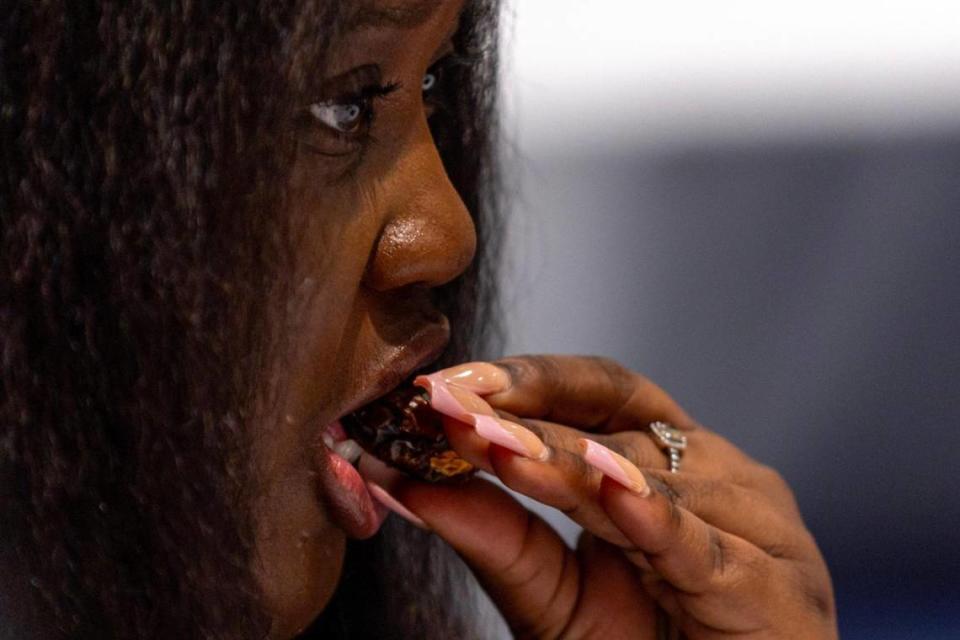
This year’s iftars come in the shadow of what Kakli, the Muslim Federation president, called an “ Islamophobic campaign” that happened in January, when a Coral Springs hotel canceled a Muslim community conference after an online campaign labeled the group “Hamas sympathizers” and sent around a petition, signed by over 4,000 people, pressuring the hotel to cancel. The South Florida Muslim Federation deemed the incident “dehumanizing” to Muslims, and ultimately rescheduled the conference. Over the weekend, a man was also arrested on charges of disrupting a religious assembly at the Islamic Center of Greater Miami in Miami Gardens.
But the success of the iftar dinners this month, he said, “is in spite of the recent episode of Islamophobia, which has not slowed us down but inspired us increase dialogue and awareness about our Islamic faith and our who we are as the South Florida Muslim community.”
A resonating fast
Unity also was the theme at an interfaith iftar dinner hosted at Florida International University in March. Sitting at tables laden with plates of dates, various fruits and cups of water (believers do not drink wine or other alcohol) guests listened to Muslim, Jewish and Christian leaders discuss how fasting is a common thread in most major religions. But it is an essential rite for Muslims during Ramadan, when the believers seek to refrain from eating, drinking and sinful behavior.
As one of the main pillars of Islam, Muslims believe fasting will bring them “closer to Allah.”
“As people ... we have the body, we have a mind or intellect, and we have a soul. And every part of us needs nourishment,” said Imam Abdul Hamid Samra of the Islamic Center of Greater Miami.
Many Muslims say that fasting takes on a different meaning while war continues to rage on in the Gaza strip and tens of thousands of Palestinian civilians struggle to find food.
“One of the reasons why we fast is to feel empathy with for those who are maybe less fortunate, or who are unable to have food in the same way we do,” said Mohamed Ghumrawi, assistant director of the Jaffer Center for Muslim World Studies at FIU and organizer of the iftar.
READ MORE: As the holy month of Ramadan begins, Gaza is on the mind of many South Florida Muslims
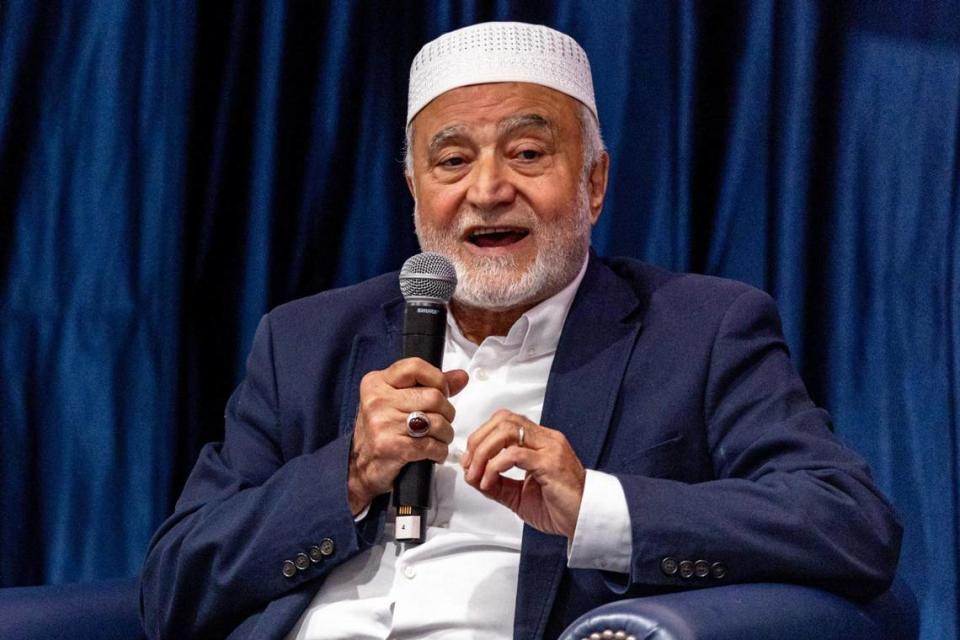
In the Jewish faith, fasting takes place during some high holy days such as Yom Kippur, said Rabbi Robyn Fisher of Temple Beth Or in Miami.
“In our tradition, if you only fast and you only pray, and you do not the third step, which is to actually change your behavior, then you haven’t really completed the tasks, you haven’t done the ritual in the way that it was meant to be done,” she said.
Some attendees discussed the need for more planned events where Jewish and Muslim friends can talk openly about their views on the war. People at the dinner said there is a desire to reconnect the two groups — especially given the years of interfaith work in the community — but that individuals are treading carefully.
“We do not want to bring what is happening in the Middle East to United States because no matter what is you believe, we all are a follower of Abrahamic faith. We believe in peace, we believe in love, we believe in communication,” said Naveed Anjum of Islamic School of Miami in Kendall.
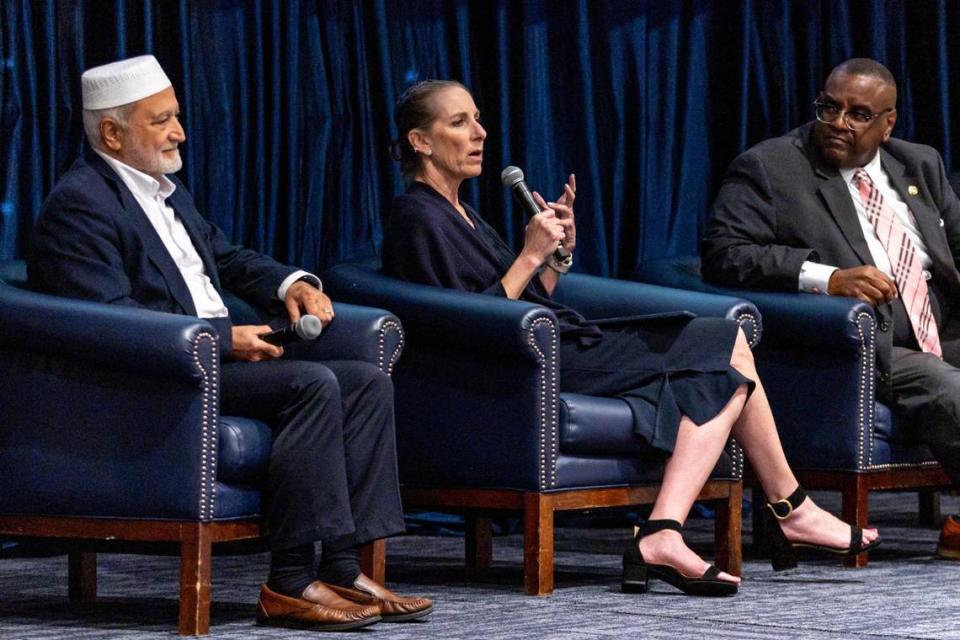
Some iftars aim to educate
Other iftars are held in private spaces, allowing guests to have more candid discussions about polarizing issues. At an iftar dinner hosted by a Coral Gables couple, for example, participants discussed the ongoing war between Israel and Hamas.
“We wanted to create a space where people can speak openly without fear of repercussions,” said host Jalal “Jay” Shehadeh, a Miami lawyer who grew up in Palestine. “It was a coming together of progressive people that have an authentic interest in speaking and sharing ideas on the subject of Palestine, Israel.”
Shehadeh and his wife and law partner Katherine have hosted similar dinners in the past to facilitate learning and sharing ideas.
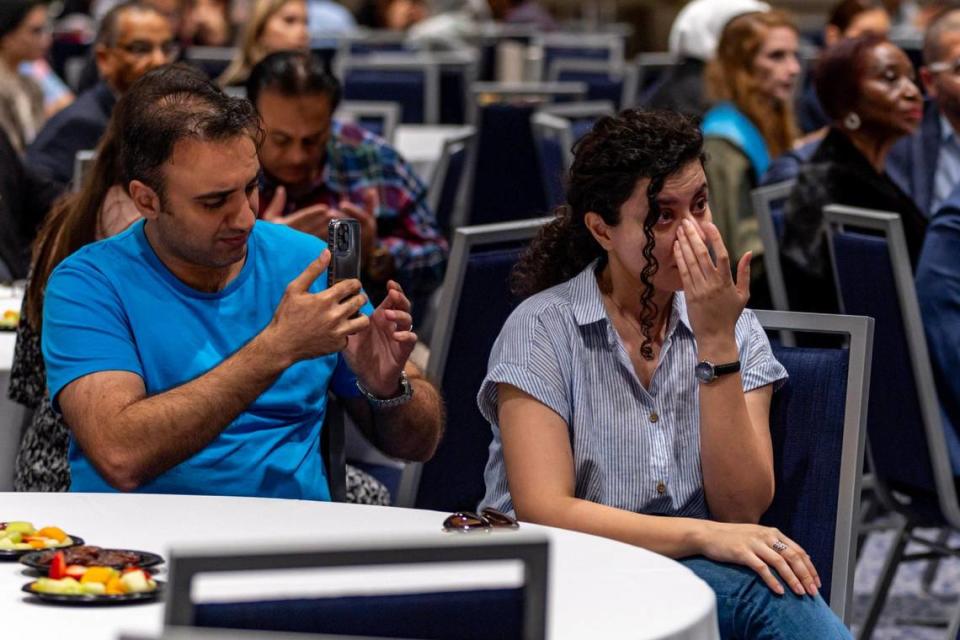
After breaking the fast, attendees listened to a presentation by Donna Nevel, co-director of nonprofit PARCEO, an education center that offers workshops on participatory action research or PAR, a collective research and organizing model that aims to build community and make change. Her workshop focused on “antisemitism from a framework of collective liberation.”
“She educated us about antisemitism, what antisemitism is, how to respond to antisemitism,” said Shehadeh, “but also ... other forms of injustice, things like Islamophobia, anti-Black racism, anti-LGBTQ hate .... how all these forms of hate are interrelated.”
Shehadeh said the discussion among attendees was “robust” and touched on issues that not everyone agreed on. The International Holocaust Remembrance Alliance’s (IHRA) definition of antisemitism, for example, has sparked debate over whether the definition intentionally conflates criticism with the state of Israel as being antisemitic. The IHRA definition was adopted in a bill passed unanimously by the Florida Senate earlier this month.
“It wasn’t an atmosphere where anybody was raising their voices at each other, but there was a heavy back and forth,” said Shehadeh.
Iftars to build community
Over a plate of spiced chicken and lentils, attendees of an iftar dinner at the Bait-un-Naseer Mosque in Hallandale Beach chatted about religious differences — some of which were evident at the event itself.
After noticing that the Ahmadi Muslim women were eating their meal in a separate room, a question was raised about why men and women are segregated at Ahmadiyya Muslim events. The mosque president, Tariq Mahmood along with other members explained the practice is in accordance with Islamic teachings, but that it is not meant to be perceived as a form of oppression. Ahmadi Muslims believe having a separate space for men and women in the mosques allows each gender to worship without distraction.
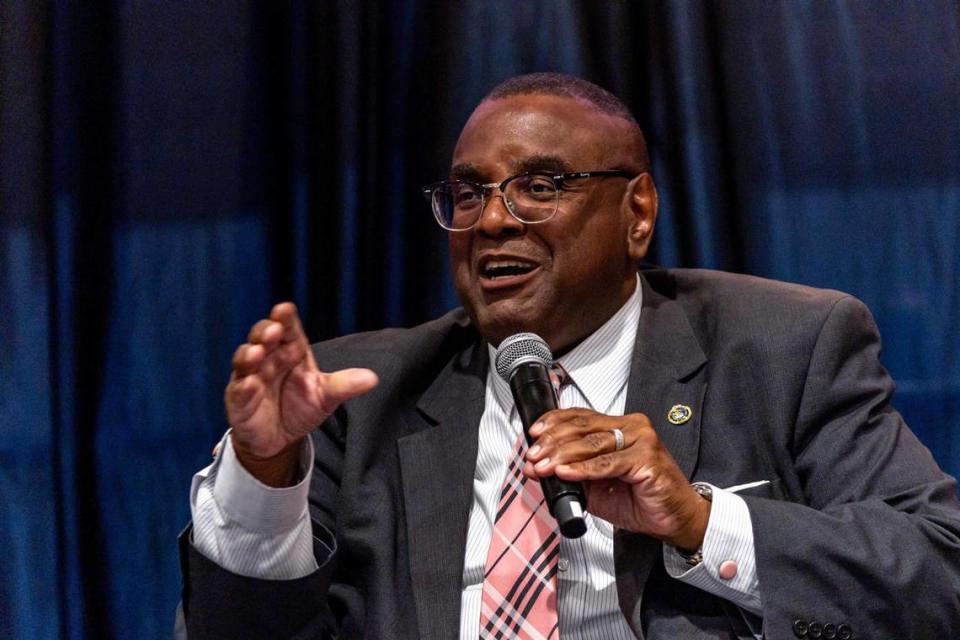
As a member of the mosque cleared plates and offered leftovers, attendee and ordained minister Norman O. Hemming III, a federal administrative law judge, was reminded why he enjoyed attending iftar dinners: He said he loves to witness people showing simple acts of care towards one another — cooking dinner, clearing plates — in an effort to connect unlikely communities.
“I’m excited about peace because I believe that things are about to change all throughout the world,” said Hemming, who has preached at the First Baptist Church of Sunrise. “In part because we have folks from all these diverse religious and ethnic backgrounds gathered here tonight means that change is gonna come.”
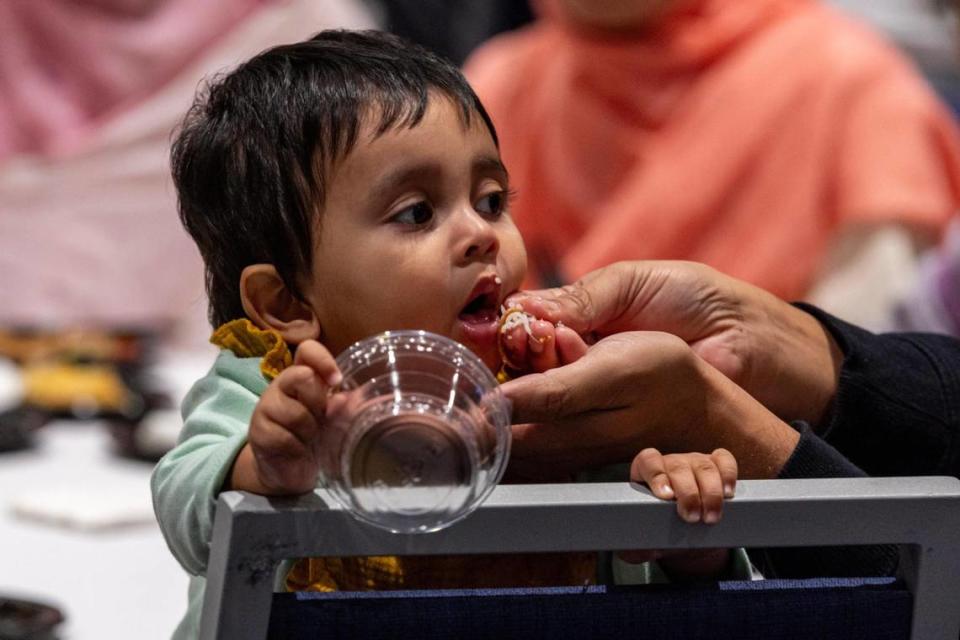
This story was produced with financial support from Trish and Dan Bell and from donors comprising the South Florida Jewish and Muslim Communities, in partnership with Journalism Funding Partners. The Miami Herald maintains full editorial control of this work.

